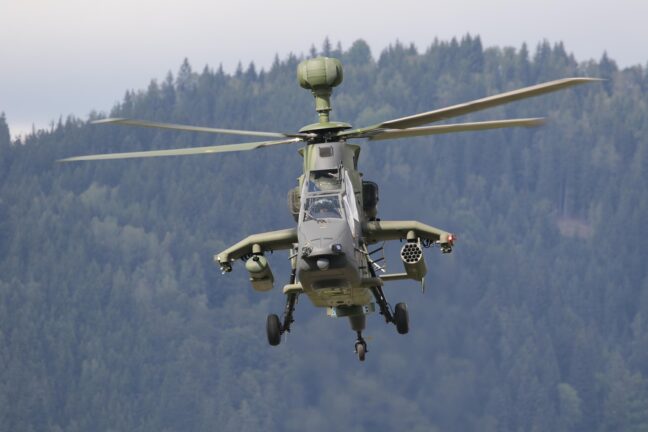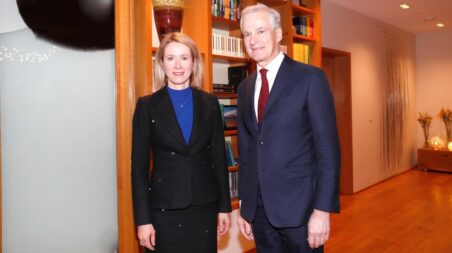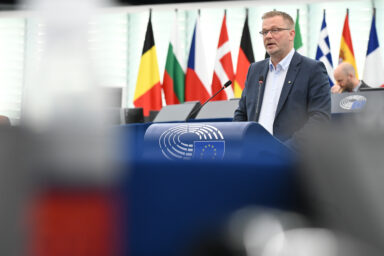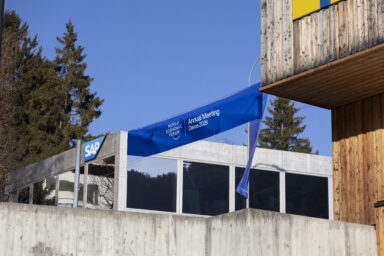European governments failed to apply for the €150bn in the new joint-procurement defence instrument in full. A third of EU member states chose not to take up the scheme for the time being. Leaving €23bn – over 15 per cent of the available funding – on the table puts the bloc’s rearmament resolve in doubt.
Eighteen EU countries have requested €127 billion from the bloc’s €150 billion joint defence procurement programme (SAFE), the European Commission revealed on Wednesday. The figure falls short of initial internal projections: Andrius Kubilius, the EU’s defence chief, had anticipated 20 applicants in what he called a “very conservative evaluation” last week.
Putin’s stooges on board
The list of applicants (Belgium, Bulgaria, Croatia, Cyprus, Czechia, Estonia, France, Greece, Hungary, Italy, Latvia, Lithuania, Poland, Portugal, Romania, Slovakia, Slovenia and Spain) reflects cautious interest. It includes both the former neighbours of the Soviet Union and today’s allies of Moscow. Hungary and Slovakia appear in both groups simultaneously, potentially raising questions about the actual intentions of their governments. The concern is Bratislava and Budapest may use the loans for purposes unrelated to defence (even as they cannot do so overtly).
With Tuesday’s deadline looming, Brussels had braced for underwhelming demand. Recent internal estimates suggested take-up between €75bn and €100bn. Just nine countries had applied by Tuesday, though the Commission stressed this was an “initial soft deadline”, leaving room for stragglers.
As late as Tuesday noon, the Commission’s official list included only Belgium, Bulgaria, Cyprus, Czechia, Estonia, Spain, Finland, Hungary, and Lithuania, a spokesperson told reporters. Previous reports had indicated that France, Ireland, Poland, Romania, Greece, Italy, Latvia, and Portugal might also show interest.
You might be interested
Waiting for latecomers
Earlier this month, Mr Kubilius and Valdis Dombrovskis, the EU’s finance chief, urged capitals to tap the fund. The remaining €23bn could be claimed by latecomers (still welcome after Tuesday, the Commission has said) or rolled into new projects next year.
Countries have until November to detail how they would spend the loans. Third countries could also join in to access procurement contracts, granted they have signed a security and defence partnership with Brussels.
EU borrowing for the financing of the new programme will enable competitively priced and attractively structured long-duration loans to requesting member states. – The European Commission
The United Kingdom is the most advanced country in the process, having signed a the partnership in May. But EU bodies have not discussed London’s involvement in detail, which means London will have to wait until September’s meeting of EU ambassadors. This would give the Brits only two months before the November deadline.
Limits exposed
The SAFE scheme’s rocky launch underscores the bloc’s belt-and-braces approach to defence spending after the double blow of Russia’s invasion of Ukraine and the Trump administration in Washington siding with the Kremlin. It also shows the limits of its leverage. “EU borrowing for the financing of the new programme will enable competitively priced and attractively structured long-duration loans to requesting member states,“ the Commission’s website says. “The terms of these loans benefit from the EU’s strong credit rating, as well as high market demand for EU issuances and their liquidity.“
Borrowing operations under the new programme will be part of the EU’s existing unified funding approach, alongside the sizable rollover operations for the management of EU’s existing debt. The fundraising effort is to consist in the issuance of single branded EU-Bonds and EU-Bills – there will be no defence-specific bonds. Actual funding needs arising from the new programme will be part of the Commission’s overall bi-annual funding planning.











